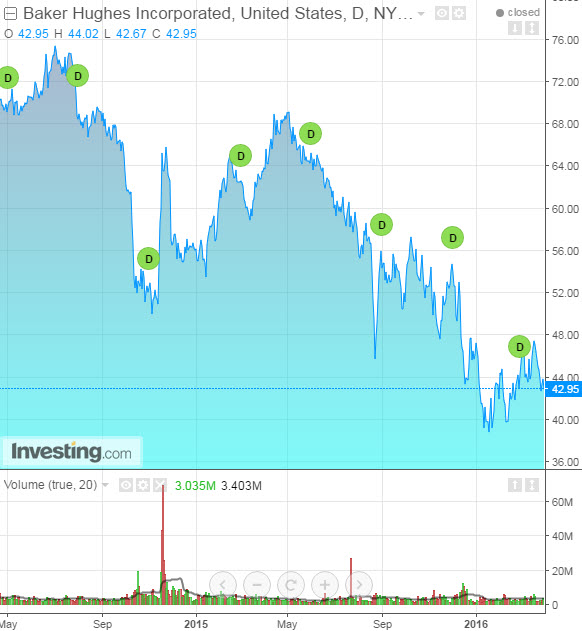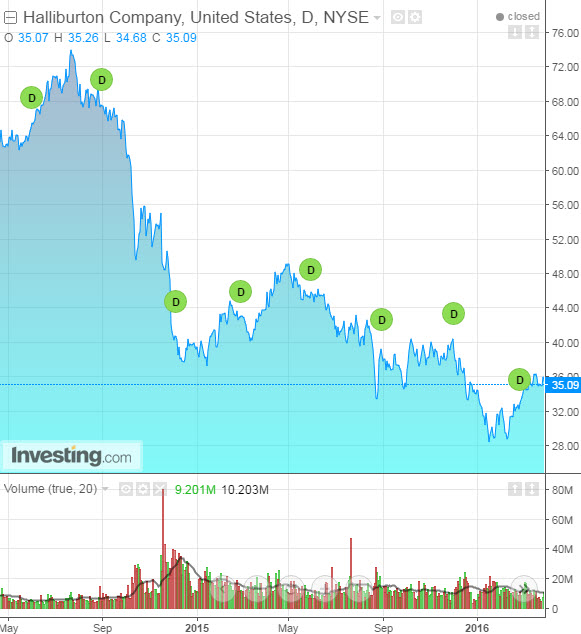by Clement Thibault
The last time oil traded above $100 was in July 2014. That's nearly two years ago.
Since then, we've witnessed a spectacular collapse, mainly due to major oversupply concerns and China's slowing economy and demand for oil. From the beginning of the year we've seen oil hit $26.05, a 12 year record low. Unfortunately for many companies and their investors, the profitability of the energy sector within equities markets is directly linked to commodity prices.
For example, Chesapeake Energy (NYSE:CHK) has almost been reduced to ashes, down 74% over the last year . Then there's Peabody Energy (NYSE:BTU), down from $76 this time last year to $2.4 dollars a share, a staggering 96.8% loss as of Friday's close.
Obviously, this plays into one of investors' biggest fears—watching a company in which you hold a stake go bankrupt, leaving (if you're lucky) some money on the table for bondholders and owners of preferred shares. Holders of common stock, however, rarely see any capital returned.
So why bother investing in the energy sector at all right now?
Fortunately, not all energy companies are created equal. While some will crumble under the weight of low commodity prices, others, like Exxon (NYSE:XOM) and Chevron (NYSE:CVX), remain relatively stable during the current market turmoil. As well diversified industry leaders, it is expected they'll survive the recent storm and keep their positions at the top of the industry.
However, survival for Exxon and Chevron right now means little capital growth achieved. We've found two oil companies with greater rewards. Each is relatively safe from bankruptcy in the short- and medium-term, and each offers even bigger upsides.
Baker Hughes
Baker Hughes (NYSE:BHI) is an American industrial services company, specializing in providing technology, drilling, production systems and reservoir consulting to the oil industry. As of today, it's the third largest oil services provider in the world. From an investor perspective, there are a few reasons why Baker Hughes is in an excellent position.
First, the company was growing steadily prior to 2015, when its revenues fell, as demand for its services slackened alongside falling oil prices. In 2014, the company grew its revenues by more than 10%. It is also financially sound from another perspective: though it has $2.7B in current liabilities, it also has $2.3B in cash on its books, not including inventory or receivables.
All told, Baker Hughes' current assets amount to $9.2B, a significantly larger sum than its long-term debt of $3.6B. But that's just the picture of the company's internal health.

In November 2014, a merger between Baker Hughes and Halliburton (NYSE:HAL) was announced. According to the deal's terms, Halliburton would pay $19 cash + 1.12 of its own shares for every Baker Hughes share.
Currently, this offer values every Baker Hughes share at $58.3. Given that the stock closed at just below $43 on Friday, the merger—should it go through—will yield a premium of about 35% per share.
Of course, there's a good chance the merger won't go through because of European Union and US anti-trust laws. Should that happen, Halliburton would pay Baker Hughes a $3.5B breakup fee for its trouble. At today's prices and with 438M of Baker Hughes shares outstanding, this $3.5B fee is an additional $8 of value per share, or an extra 18% to the $42.95 a share costs today.
A growing company that remains outside the extended oil slump, with manageable short- and long-term debt, in the middle of an acquisition, where the shareholders benefit whether the deal goes through or not? That's a win no matter which sector you opt into.
Halliburton
On the other side of the proposed merger, Halliburton Company (NYSE:HAL), is in pretty good shape too. Halliburton is the world's second largest oil services provider, ahead of Baker Hughes but well behind industry leader Schlumberger (NYSE:SLB), which is currently worth $90B, three times Halliburton's market cap. Hence the necessity and potential difficulty of the merger.

However, with or without the merger Halliburton is doing just fine. Its cash holdings are almost double its current liabilities, meaning the company is very unlikely to go bankrupt anytime soon.
Should the merger go through, Baker Hughes will add overseas lines to HAL's stable, providing a nice cash flow boost as well as fracking capabilities. But Halliburton can also take the heat of a failed merger, if that were to occur. And while the $3.5B resulting liability would represent a little over 10% of Halliburton's market cap, it wouldn't be enough of a blow to shut down the operation.
No one knows exactly when, or if, an oil recovery will take place, as it is infamously controlled more by international, power politics than by simple supply and demand. While uncertainty continues to reign in the oil sector, here are the key considerations to look for and invest in: strong and resilient companies with little chance of going under, whose operations are also primed for a strong recovery. Halliburton and Baker Hughes both resoundingly meet these criteria.
